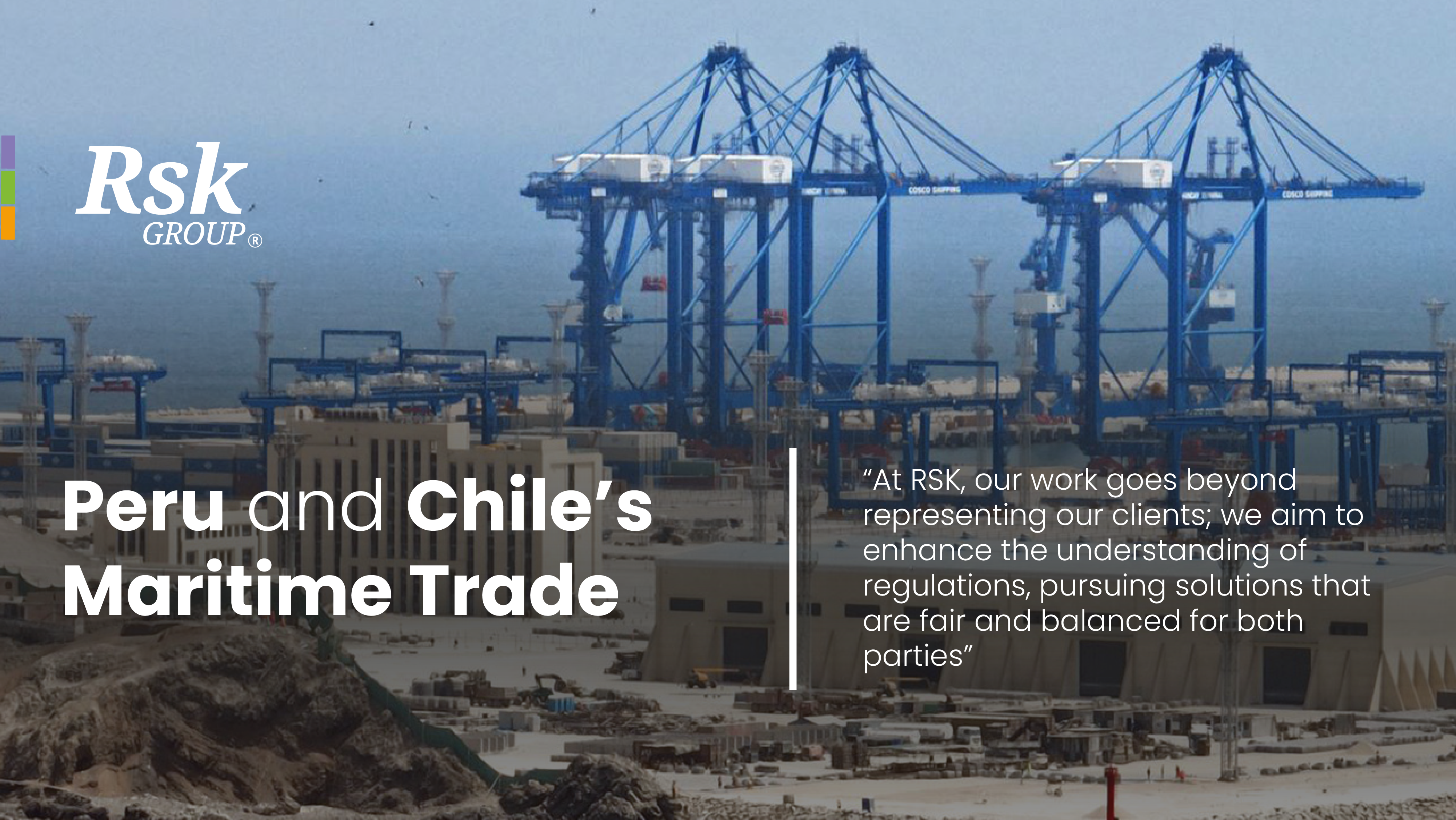
Valparaíso Region, Chile
Peru and Chile’s Maritime Trade: “At RSK, our work goes beyond representing our clients; we aim to enhance the understanding of regulations, pursuing solutions that are fair and balanced for both parties”
November 14, 2024
The large-scale port project in Chancay, funded by a Chinese investment, seeks to establish Peru as a continental-scale maritime hub. However, despite some similarities, differences between Chilean and Peruvian regulatory frameworks raise questions about each country’s capacity to effectively handle conflicts arising from the transport of perishable cargo. This report analyses the situation in both countries and highlights RSK’s expertise in claims’ management.
With the inauguration of the Chancay port scheduled for November 14, 2024, Peru stands on the brink of a transformative shift in its port infrastructure, aiming to position itself as a central hub in South American maritime trade. Led by the Chinese shipping company Cosco, this mega-project aims to turn Peru into the “Singapore of Latin America,” as expressed by Minister of Foreign Trade and Tourism, Juan Carlos Mathews. However, with the projected rise in export flows, the question arises of whether Peru’s legal framework is prepared to address the complexities of this trade, particularly in handling claims for perishable cargo. This context provides an opportunity to examine the role of regulatory updates in Peru and how Chile’s experience can serve as a model for regulating this sector.
An International Legal Comparison
Chile and Peru have both adopted a set of international rules that govern maritime carriers’ liability, known as the Hamburg Rules, though their implementation and application have followed different paths.
In Chile, these rules became mandatory with their ratification in 1982, and in 1988 they were incorporated into the Commercial Code, reinforcing a system of liability and dispute resolution in the maritime carriage of cargo.
In Peru, while these rules became mandatory on April 1st, 2022, the accompanying legal framework still relies on a Commercial Code over a century old and a Civil Code that does not fully address the needs of modern commerce. Paul Maxwell, RSK’s Country Manager in Peru and Maritime Law expert, notes, “The absence of a specialized body of maritime law arbitrators and reliance on a commercial framework dating back to 1902 creates significant uncertainty for Peruvian exporters, who struggle to find the necessary support within the judicial system to protect their interests.”
The Chilean Context
Chile, one of the first countries in South America to adopt modern updates to its maritime regulations, has established a specialized arbitration system for maritime conflict resolutions. This approach not only facilitates the application of law but has also fostered the development of arbitrators with Maritime Law expertise, strengthening legal certainty in the sector.
“The Chilean model ensures that conflicts are managed by professionals with deep knowledge of maritime trade and navigation,” Maxwell says. “This not only brings stability to the system but also ensures that each party meets its responsibilities, providing legal certainty to exporters and carriers.” This consolidation has positioned Chile as a regional reference, offering predictability to both exporters and transport operators.
Likewise, Camila Letelier, Maritime Law specialist and litigation attorney at RSK in Chile, explains, “These regulations have been fundamental for us as they provide exporters with presumptions that facilitate maritime transport claims, shifting the burden of proof onto the carrier. This offers essential protection to exporters against major shipping companies.”
Letelier also observes that while the regulation has strengthened Chilean maritime trade, there is still work to be done in research and doctrinal development to approach various viewpoints. “Most doctrine in Chile is written by lawyers representing shipping companies, leading to interpretations that favor their interests. It would be valuable for lawyers defending exporters to contribute with studies, publications, and participation in conferences to balance the analysis of this regulation,” she explains.
Peru and the Challenge of Implementation
After 60 years under a different regime (the Hague Rules), Peru’s recent ratification of more modern regulations aims to offer a more favourable regime for exporters, reflecting the country’s growing role in international maritime trade. Although the current legal framework still depends on regulations from another era, the adoption of these updates demonstrates Peru’s commitment to modernizing the sector and providing greater protection for its exporters.
Maxwell remarks, “Peru is a prominent player in maritime trade at the moment, with substantial port infrastructure and sector investments, along with the vast volume of fruit exported worldwide. The recent adoption of regulations like these shows the country is embracing its role as a major exporting nation and taking steps to offer a more protective legal framework for cargo interests.” Although the path to implementation still poses challenges — such as conflict resolution — Peru, with the ratification of the Hamburg Rules, must establish a complete legal framework that brings confidence in both its exporters and the maritime operators.
The Role of RSK in a Complex Environment
In this context, RSK’s role is particularly relevant in both Peru and Chile. From the Peruvian perspective, Paul Maxwell emphasizes that for exporters, RSK’s knowledge and expertise in interpreting regulations provide valuable support in the conflict resolution process. “We are a strategic ally in understanding the regulations governing carriers’ liability, with over 18 years of experience built in Chile. Today, under the same regime in Peru, we can be the key ally needed to accurately interpret these rules,” he explains. Thanks to this expertise, RSK uses its knowledge to reach reasonable agreements that benefit both parties without the need to litigate.
In Chile, Letelier highlights that RSK’s accumulated experience has established a solid foundation of legal knowledge supporting cargo interests in conflict situations. “At RSK, our work goes beyond representing our clients; we aim to enhance the understanding of regulations, pursuing solutions that are fair and balanced for both parties. In the case of Peru, we apply this experience to optimize exporter protection in a developing system,” Letelier comments.
In conclusion, given this context of growth and investment in port infrastructure, RSK emerges as a key strategic partner in claims management for exporters. “Today, RSK’s role is to help our clients achieve fair agreements for both parties, applying all the knowledge our team has developed over the years and adapting it to each country’s context,” Maxwell affirms. Through this mission, RSK’s expertise in interpreting and applying maritime regulations helps bridge gaps in current legislation, promoting a safer and more equitable trading environment for exporters in the region.


